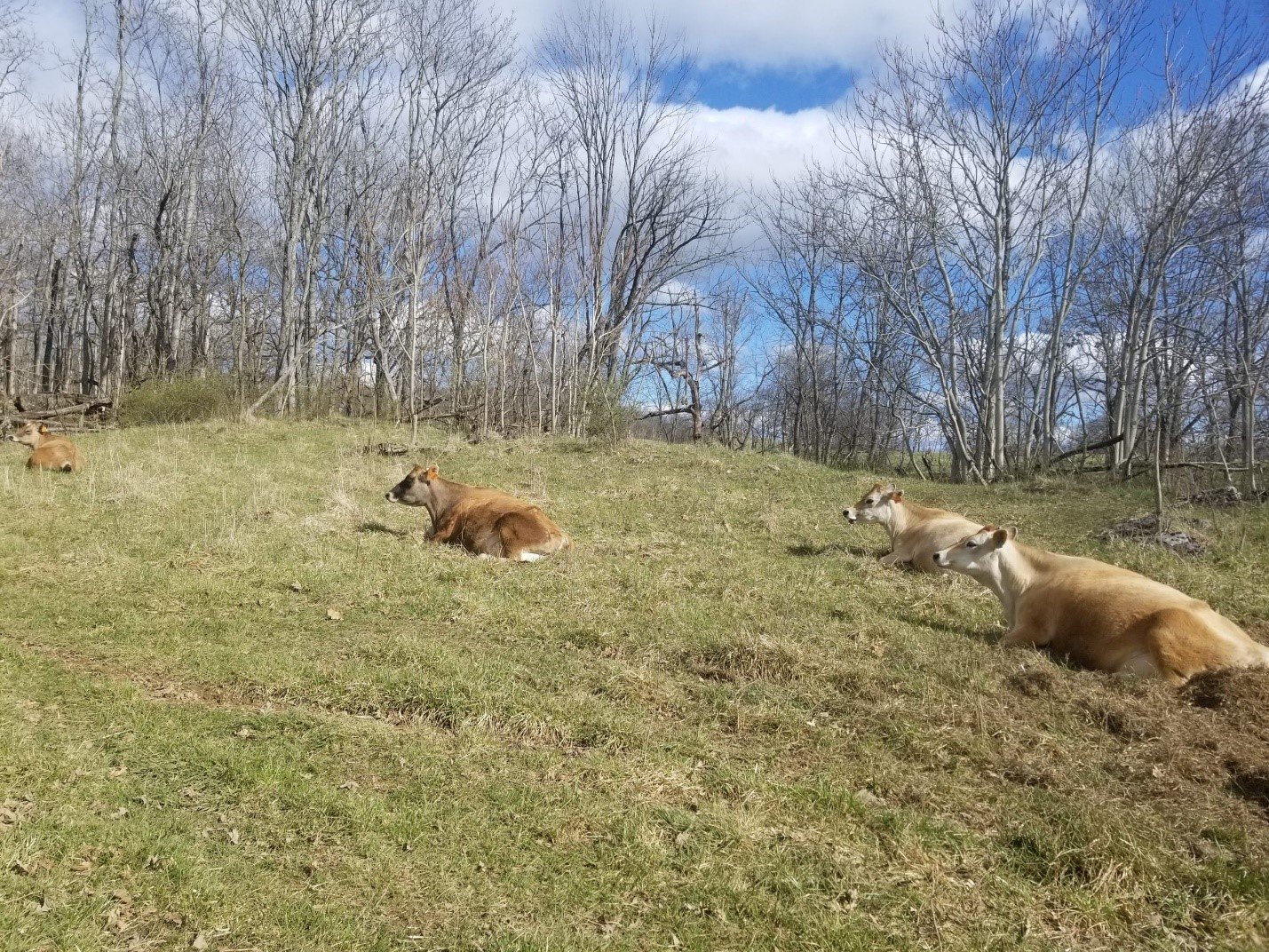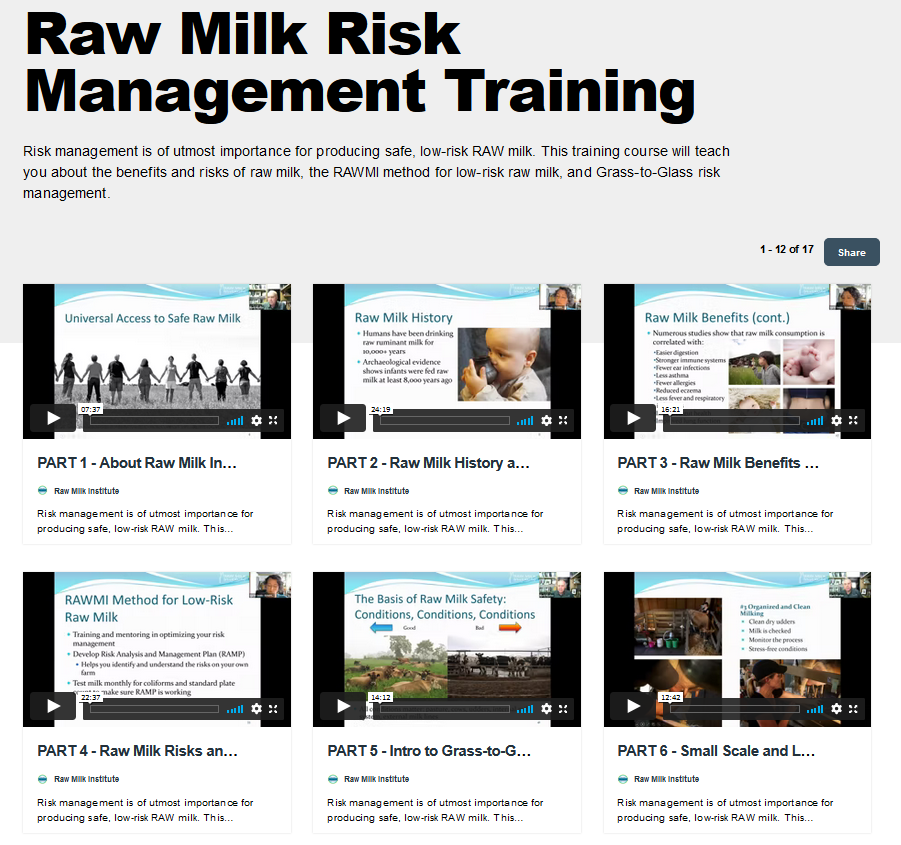The Raw Milk Institute (RAWMI) is on a mission to improve the safety and quality of raw milk and raw milk products through farmer training, rigorous raw milk standards, raw milk research, and improving consumer education.
In 2021, RAWMI was awarded a 3rd grant for $50k from the Regenerative Agriculture Foundation (RAF) to further our work. RAWMI matches an economic benefit of stewardship of pastures and soils to high value raw dairy products for consumers. Safe raw milk from pastured cows can sustain the farm financially while the grazing improves the soils.
With the 3rd grant from RAF, RAWMI was able to accomplish much towards the overall goal of universal access to safe raw milk. With the unique continuing challenges of 2021, RAWMI was able to carry on with making progress through the latest methods and models for training and outreach.
Over the last year, RAWMI:
Trained over 250 farmers, legislators, university professors, and consumers on raw milk benefits and risk management
Prepared and presented a 1.5 hour training course for dairy farmers who are considering the switch to raw milk, for the Massachusetts Northeast Organic Farmers Association (NOFA-MASS)
Developed 17-part Raw Milk Risk Management online video training series for raw milk farmers, which has been accessed by hundreds of additional farmers
Worked with state and local regulators in Montana to develop a model for training raw milk farmers
LISTED six new farms in Virginia, California, Michigan, British Columbia Canada, North Carolina, and Arkansas, who each went through the process of developing an individualized Risk Assessment and Management Plan (RAMP) for managing the health and hygiene of their unique farms
Provided one-on-one mentoring in the production of low-risk raw milk to over 30 additional farms in California, Michigan, Virginia, Montana, Pennsylvania, Texas, Idaho, Vermont, Iowa, North Dakota, Washington, Oregon, New Zealand, Czech Republic, Ontario Canada, and British Columbia Canada
Hosted quarterly meetings for LISTED farmers, which allow the farmers to stay up-to-date on the latest lessons learned for safe raw milk
Performed an independent research study on pathogen growth in raw milk
Amassed hundreds of raw milk test data from RAWMI LISTED farms
Attended and sponsored International Milk Genomics Consortium Conference
Worked with researchers from Spectacular Labs who are developing on-farm technology for pathogen testing
Worked towards legalization of interstate raw butter and increased legal access to raw milk in Iowa and Canada (with Canadian Artisan Dairy Alliance)
Published 9 content pieces on the RAWMI website and developed new brochure on the Benefits of Raw Milk
Developed on-farm lab training materials and provided on-farm lab sponsorships to 5 farms
Raw Milk Training
RAWMI taught about raw milk health benefits and safety throughout the United States via web-based training. Whenever RAWMI teaches about raw milk risk management, soil and conditions management are emphasized as key elements in creating healthy, sustainable farms.
Dairy animals grazing on pastures provide a critical link to the soil biome and restorative farm practices. Pasture-based dairy farms produce healthy soils that are rehabilitated and renewed through the cycle of returning organic carbon to the soil in the form of plants biomass and manure. The resulting food that is harvested by either the animals or the farmer is rich in nutritional elements needed for human health.
Real-Time Training Courses
Via Zoom and podcast, raw milk and organic farming training was presented to over 250 farmers, legislators, university professors, university students, and consumers in association with the following:
Massachusetts Northeast Organic Farmers Association (NOFA-Mass)
Rutgers University
Here’s to Your Health podcast with Josh Lane
On-Demand Training Course
RAWMI developed a 17-part video training series on Raw Milk Risk Management. This training series is now available for FREE on both the RAWMI website and Vimeo. This video training has been accessed by hundreds of farmers.
Raw Milk Support in Montana
In Montana, raw milk was recently legalized with no regulatory oversight with the adoption of SB199. This seeming victory for food freedom has the potential to go awry if raw dairy farmers are not properly trained in the production of low-risk raw milk.
After an outbreak of Campylobacter was tied to one raw dairy farm in Montana, RAWMI was contacted and became heavily involved in helping the farmer learn best practices for raw milk production, install an on-farm lab for milk bacterial testing, and build better facilities for ongoing production of safe raw milk.
RAWMI is now collaborating with state and local regulators to develop a model for training Montana raw milk farmers in the production of low-risk raw milk. In partnership with Alternative Energy Resources Organization (AERO), RAWMI was awarded a small grant for $5k to cover travel costs for onsite training in Montana later in 2022. This training program will help in ensuring that the legalization of raw milk in Montana is a long-term success.
Farmer Mentoring
RAWMI worked with individual farmers across the United States, Canada, and internationally. RAWMI provided one-on-one mentoring and troubleshooting support for low-risk raw milk production, including helping farmers optimize their raw milk production, overcome problems in their milk systems and testing, and learn more about successful business practices. This mentorship benefited farmers in:
California
Idaho
Iowa
Michigan
Montana
North Dakota
Oregon
Pennsylvania
Texas
Vermont
Virginia
Washington
New Zealand
Czech Republic
British Columbia, Canada
Ontario, Canada
RAWMI LISTED Farms
RAWMI LISTED farmers are dedicated to producing clean, safe raw milk. The RAWMI listing process involves the development of individualized Risk Assessment and Management Plans (RAMPs) for managing the health and hygiene of each unique farm. RAWMI LISTED farms submit test data monthly to show that they are in compliance with RAWMI Common Standards, which target a rolling three-month average of <5,000 standard plate count (SPC) and <10 coliforms per ml of raw milk.
In the last year, RAWMI LISTED six more farms, in Virginia, California, Michigan, British Columbia Canada, North Carolina, and Arkansas. To-date, RAWMI has LISTED 29 farms, and there are currently 22 active LISTED farms in the United States and Canada.
RAWMI provided continuing support to all LISTED farmers to enable sustained excellence in low-risk raw milk. This included quarterly meetings for LISTED farmers, which allow the farmers to stay up-to-date on the latest lessons learned for safe raw milk, exchange ideas for improvements, and collaborate with the RAWMI Board of directors.
Raw Milk Research and Science
RAWMI’s mission includes supporting raw milk research and science. Through this work, RAWMI helps raw milk become safer and more accepted by regulatory agencies.
Pathogen Growth Study
In order to generate a stronger scientific basis for assessments of risks of pathogen growth in raw milk, RAWMI commissioned a pilot study on pathogen growth performed by an independent 3rd party lab certified to perform pathogen testing, Food Safety Net Services (FSNS). This pilot study was partially paid for through donations.
In this pilot study, samples of well-produced raw milk were purposely inoculated at two levels with the four main pathogens of concern for raw milk: E coli 0157:H7, Salmonella spp., Campylobacter spp., and Listeria monocytogenes. The objective of this pilot study was to document growth characteristics of these pathogens in carefully produced raw milk over a period of 14 days when stored at the refrigeration temperature recommended by FDA and USDA.
The most relevant finding of the study was that at moderate Inoculum Level I, no pathogen growth was observed through at least 6 days of refrigerated storage. Over the study period of 14 days, the counts per mL of E coli 0157:H7, Salmonella spp., and Campylobacter spp. decreased over time. These results indicate that, when stored at the recommended refrigerator temperature, moderate to high counts of E coli 0157:H7, Salmonella spp., and Campylobacter spp. did not multiply over time in raw milk. Listeria monocytogenes exhibited some growth in this study after 9 days of refrigeration at both moderate- and high-level inoculum levels.
Raw Milk Bacterial Test Data
RAWMI LISTED farmers test their milk at least monthly for coliforms and Standard Plate Count (SPC). These tests provide a way to measure the amount of bacteria present in the milk, as well as providing a measure of the overall hygiene and cleanliness of the milk. Monthly testing serves as a useful confirmation step for ensuring that raw milk is being produced in a way that discourages pathogen growth and is therefore low-risk.
Test data from LISTED farms is submitted to RAWMI monthly. RAWMI amassed hundreds of test data from RAWMI LISTED farms over the last year. This data can be used for raw milk research and demonstrates that low-risk raw milk is achievable on both small-scale and large-scale raw dairy farms.
International Milk Genomics Consortium
RAWMI was a sponsor of the 18th International Milk Genomics Consortium (IMGC) and attended the virtual IMGC conference. As part of that conference, RAWMI is now engaged with international research and relationships with PhD researchers across the world. The IMGC provides access to the most leading-edge studies on milk genomics.
An abstract about the pathogen growth pilot study is being prepared for presentation at the 19th IMGC conference later in 2022.
Development of On-Farm Pathogen Testing Technology
On-farm pathogen testing for raw milk has been considered too risky due to the potential for cross-contamination and inadvertent pathogen release. However, researchers from Spectacular Labs are developing new technology for rapid on-farm pathogen testing. RAWMI collaborated with Spectacular Labs by providing a real-world farm environment where they could test their concept.
Raw Dairy Legalization and Support
RAWMI continued to collaborate with the Farm-to-Consumer Legal Defense Fund (FTCLDF) towards the legalization of raw butter. Raw butter is an exceptionally nutritious food. For instance, the enzyme alkaline phosphatase (ALP) is found in the butter fat membrane that covers fat globules. ALP decreases inflammation in the body; it is associated with good health and less chronic illness, such as cardiovascular disease and Type-2 diabetes. Raw milk has 4% butter fat, but raw butter contains 86% fat and thus it is very high in alkaline phosphatase. ALP enzyme is destroyed by pasteurization. The case for legalization of raw butter is currently in Federal Appeals Court, and the next step is the US Supreme Court.
RAWMI worked towards legalization of raw milk in specific states and countries. RAWMI provided support for lawmakers and farmers who were proposing a bill to legalize raw milk in Iowa. Additionally, RAWMI collaborated with the Canadian Artisan Dairy Alliance, who is working towards legalization of raw milk in Canada.
RAWMI also created outreach materials for educating state agriculture departments about the benefits of raw milk for dairy farmers. RAWMI mailed letters to state agriculture departments all across the USA.
Raw Dairy Educational Outreach
RAWMI created educational materials and articles for raw milk consumers and the general public. Numerous articles were published to the RAWMI website and social media, with a wide array of topics including:
Allergies and raw milk
Profiles of 6 raw milk farmers across the USA and Canada
“It’s Time to Go Raw” seminar for organic dairy farmers
Pathogen growth in raw milk
Importance of predictive microbiology for raw milk risk assessment
Breastfeeding and peanut allergies
Benefits of milk on osteoarthritis
Raw milk and protection against eczema
Nutritional benefits of raw milk
How and why to make milk kefir
Dairy foods and fall prevention in older adults
Benefits of pasture-based farming
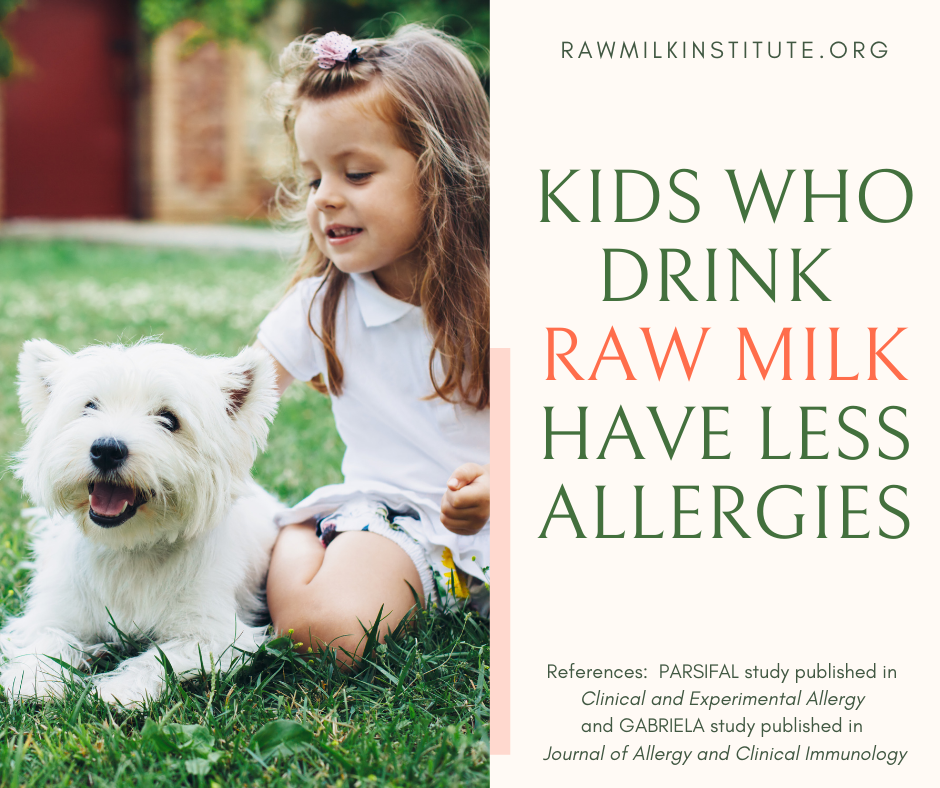
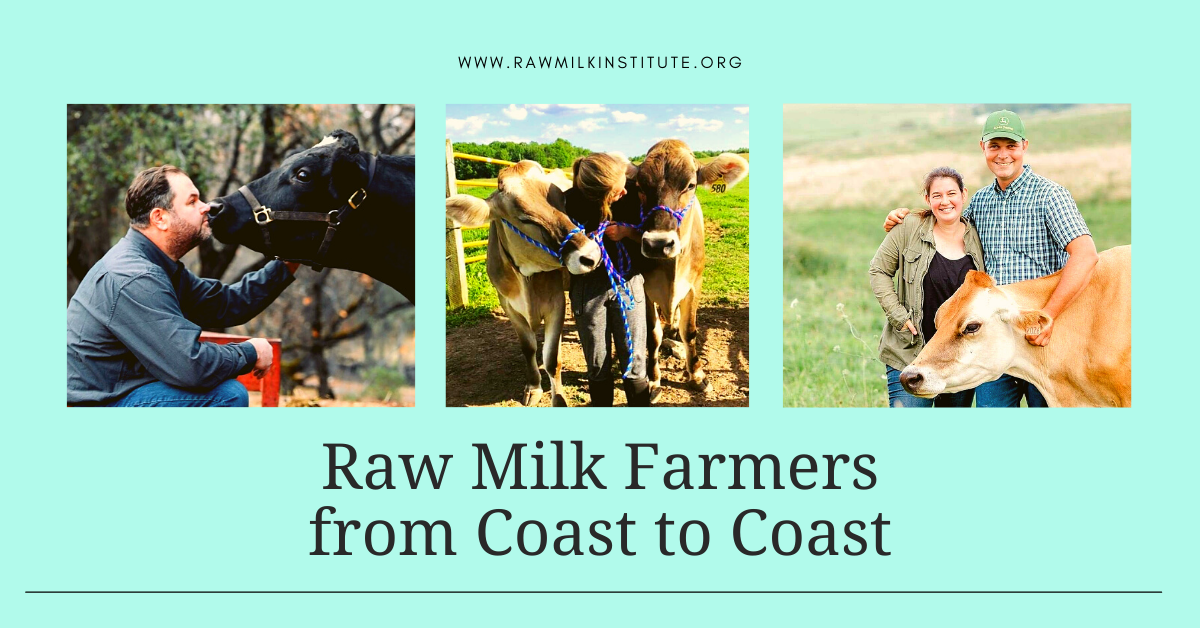
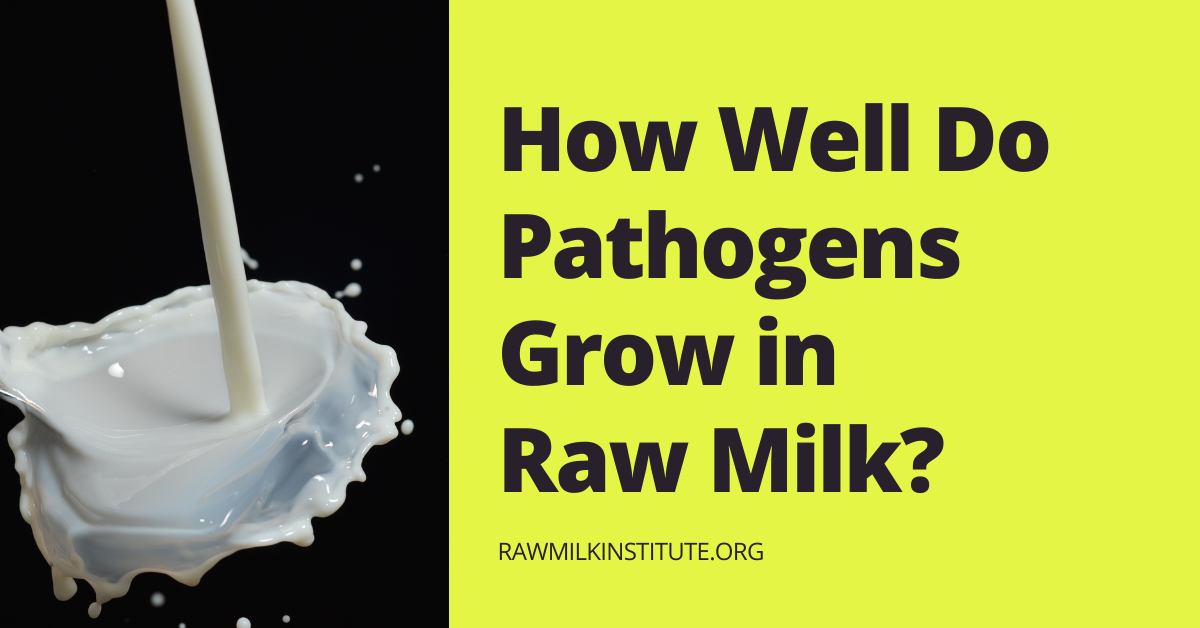
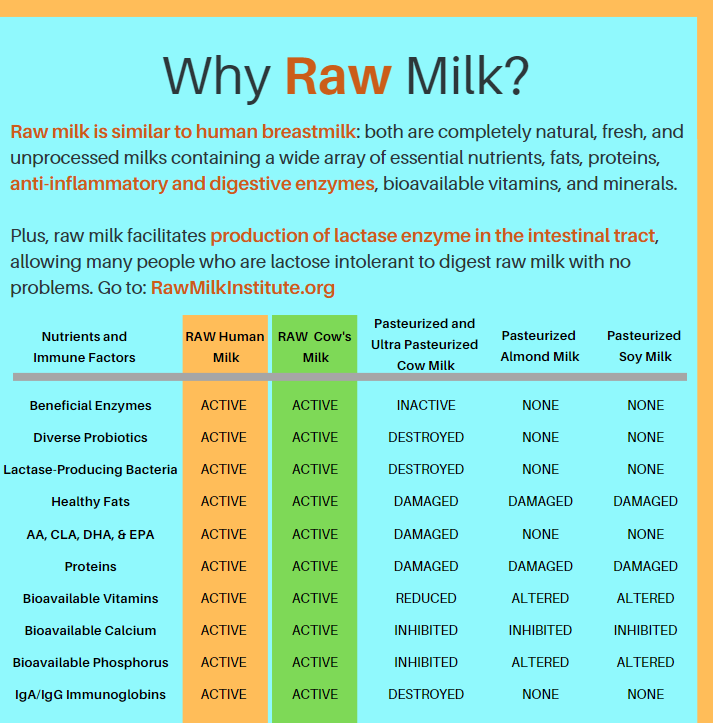
On-Farm Lab Training and Sponsorships
Frequent bacterial testing of raw milk is one of the pillars of producing low-risk raw milk. However, milk testing costs can be an ongoing financial burden which make small-scale farmers hesitant to test their milk often. On-farm testing is a great solution to this dilemma.
On-farm lab testing is a powerful tool for raw milk farmers. It allows for frequent testing, so farmers can better identify issues before they turn into big problems, and it also helps immeasurably with troubleshooting when needed. On-farm labs require an initial investment of $800-$1,000, but once the lab is in-place the cost per test is only $1-$3. With RAWMI’s sponsorship, five additional farms were able to build their own on-farm labs for testing coliforms and Standard Plate Count.
RAWMI also created educational materials about on-farm labs, including materials lists, how-to guides, and methods for using different brands of testing media.

